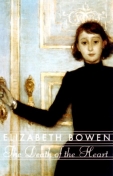BKMT READING GUIDES
The Death of the Heart
by Elizabeth Bowen
Paperback : 418 pages
0 club reading this now
0 members have read this book
Introduction
The Death of the Heart is perhaps Elizabeth Bowen's best-known book. As she deftly and delicately exposes the cruelty that lurks behind the polished surfaces of conventional society, Bowen reveals herself as a masterful novelist who combines a sense of humor with a devastating gift for divining human motivations.
In this piercing story of innocence betrayed set in the thirties, the orphaned Portia is stranded in the sophisticated and politely treacherous world of her wealthy half-brother's home in London.There she encounters the attractive, carefree cad Eddie. To him, Portia is at once child and woman, and her fears her gushing love. To her, Eddie is the only reaason to be alive. But when Eddie follows Portia to a sea-side resort, the flash of a cigarette lighter in a darkened cinema illuminates a stunning romantic betrayal--and sets in motion one of the most moving and desperate flights of the heart in modern literature.
Editorial Review
Five words of advice on reading Elizabeth Bowen: Resist the urge to skim. In The Death of the Heart, Bowen's writing rolls ever onward, accruing the sensations and ironies of conscious living till the final effect is massive. This is not prose for people who like their fiction with a cool, Calvin Klein-like minimalism. Bowen's people are keenly aware, and she seems to catalogue every sweaty moment, every betraying glance. The reader must stay right there with her, because hidden among lengthy descriptions of sea air and drawing-room politics are pithy asides worthy of great humorists: "Absence blots people out. We really have no absent friends." Skimmers miss out.The Death of the Heart is Bowen's most perfectly made book. Portia, an orphan, comes to live in London with her half-brother, Thomas, and his wife, Anna. A child of sin raised in a series of shabby French hotels, Portia is possessed of a kind of terrible innocence. Like Chance the Gardener in pigtails, she literally can't comprehend evil or unkind motives. Unfortunately for her, she falls in with Anna's friend Eddie, who seems to be made entirely of bad motives. Though the plot follows Portia's relationship with Eddie, the novel's real tension lies between Portia and Anna, as the girl comes to grief against the shoals of Anna's glittering, urbane cynicism. But the book transcends the theme of innocence corrupted. As in Graham Greene's The Quiet American, Bowen inverts the formula to show the destructive power of innocence itself:
Innocence so constantly finds itself in a false position that inwardly innocent people learn to be disingenuous.... Incurable strangers to the world, they never cease to exact a heroic happiness. Their singleness, their ruthlessness, their one continuous wish makes them bound to be cruel, and to suffer cruelty. The innocent are so few that two of them seldom meet--and when they do, their victims lie strewn all around.Bowen has a fine eye for such shadings of morality, but finer still is her understanding of the way humans bump up against the material world. Her writing on weather, both emotional and meteorological, compares with the best of Henry James: "One's first day by the sea, one's being feels salt, strong, resilient, and hollow--like a seaweed pod not giving under the heel."
Always a sensitive observer of the way we live, in her lesser books Bowen deals in mind games and then delivers trumped-up, bloody endings. In The Death of the Heart, she keeps all the action between her characters' ears, and comes up with one of the great midcentury psychological novels. --Claire Dederer
Discussion Questions
No discussion questions at this time.Book Club Recommendations
Recommended to book clubs by 0 of 0 members.
Book Club HQ to over 90,000+ book clubs and ready to welcome yours.
Get free weekly updates on top club picks, book giveaways, author events and more








